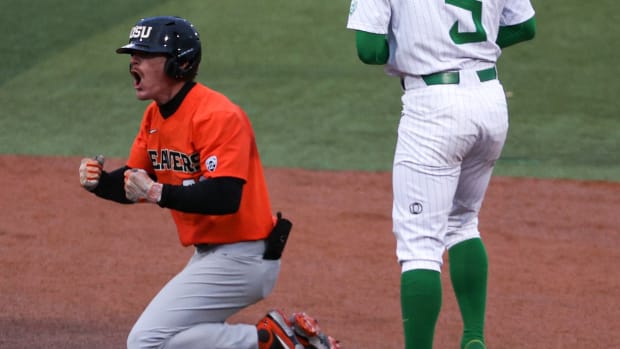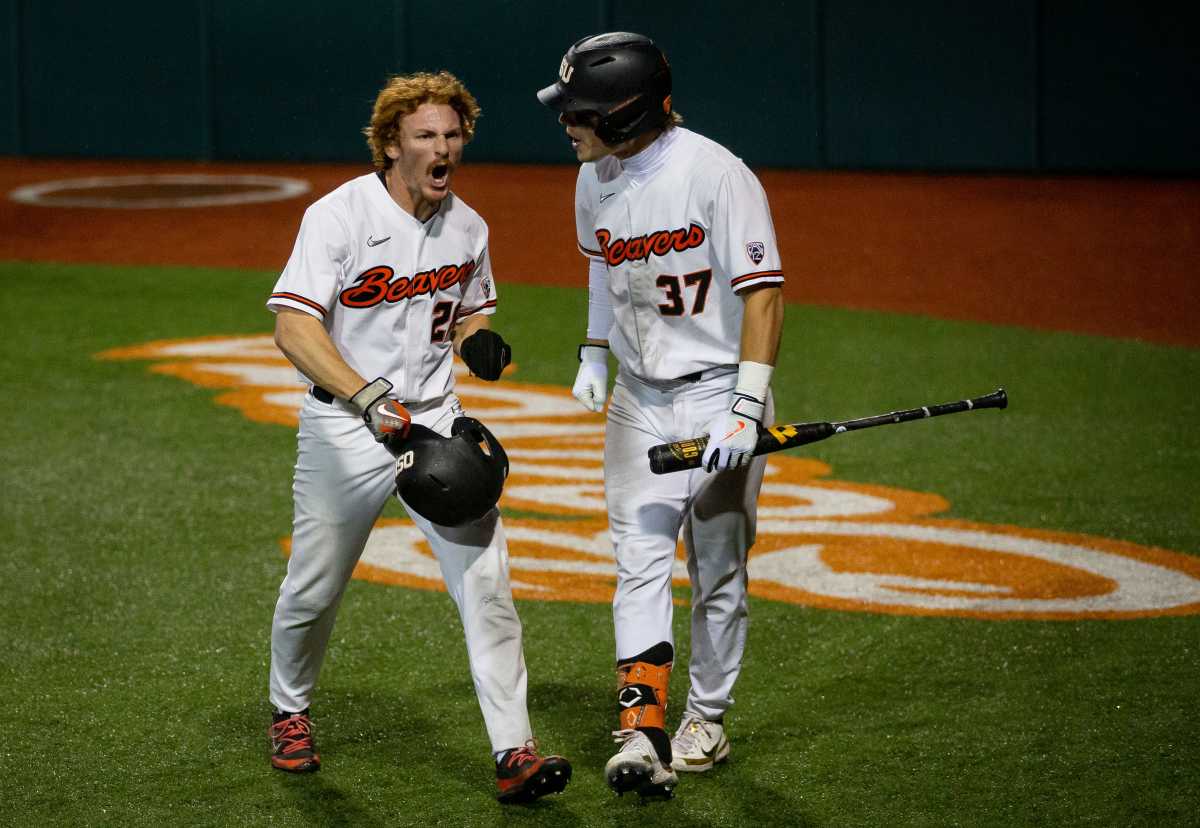SF Giants: How getting cut at Oregon State revived Wade Meckler's career

With the 2022 season winding down, SF Giants prospect Wade Meckler can look back on the most successful baseball season of his life. Meckler began the year as a senior outfielder at Oregon State, where he went on to hit .347/.456/.478. His performance at Oregon State led the Giants to draft him in the eighth round of this summer's draft.
First assigned to the Giants Rookie League affiliate in Arizona, Meckler immediately became one of the team's most productive hitters. He hit .333/.471/.482 in 16 games, highlighted by five hits in a three-game championship series, which the Giants affiliate won.
After capturing the league title, Meckler was promoted along with several other standouts to the Giants Single-A affiliate in San Jose. The San Jose Giants were in the middle of a playoff race of their own and Meckler picked up right where he left off.
San Jose would be eliminated in the first round of the California League postseason, but Meckler recorded seven doubles and a homer alongside a .388/.492/.592 triple-slash in 13 games.
In a few months, Meckler has already proven he belongs in professional baseball. Roughly three years ago, though, his own coaches doubted his ability to make an impact at the college level.
In the fall of 2019, Oregon State baseball coaches had a difficult conversation with outfielder Meckler. Meckler had been barely recruited out of high school. He did not receive a scholarship offer from any Division-I or Division-II programs.
As Joe Freeman of The Oregonian detailed in a profile of Meckler earlier this year, the left-handed hitter dealt with some tremendously bad luck in recruiting. He reached the academic requirements to attend prestigious academic institutions. Harvard, Yale, and Georgetown considered him among the final two candidates for the last spot on their rosters. Each coaching staff chose the other player in consideration. It was only through a last-minute effort by a well-connected Southern California baseball man that Meckler received an opportunity to walk on at Oregon State in the first play.
By 2019, though, it made sense to move on from Corvallis. Meckler had appeared in 20 games as a freshman almost exclusively as a pinch-runner. At the plate, he managed just one hit in 10 at-bats. Oregon State head coach Mitch Canham had been evaluating the team for months and explained to Meckler that he had no future on the current roster.
Canham did not want the young outfielder to waste his collegiate eligibility on the bench and encouraged him to transfer to a program with an easier path to playing time. Meckler had other ideas, though. In a conversation with Giants Baseball Insider, Meckler recalled what he told Canham, "No I’m staying here," he said. "I’m going to prove to you that you need me."

With his career on the line, Meckler spent the offseason improving his strength and rebuilding his swing. Neither were new to him. Meckler had been a 4'10'' freshman in high school who weighed just 75 pounds. While a high school growth spurt eventually brought him up to 5'10'', he lacked the strength of his peers. He knew he had to get more out of his swing.
"It was mostly swing changes," Meckler said. "I’ve always been a guy that has pretty good bat-to-ball skills, but I wasn’t making good quality contact."
It's easy to see why the Giants were so high on Meckler when you hear him talk about hitting. He's already able to break down his swing on a level that matches some hitting coaches.
In his conversation with Giants Baseball Insider, he was hesitant to get too granular at first but acknowledged he has over 10 pages of notes on his phone about the ideal mechanics of his swing. After a few nudges, though, he dove in and broke down the changes he's made with ease.
"So, I knew I had to find a way to get behind the baseball," Meckler explained. "A lot of it was just focusing on creating tension throughout my gather and my load... I was extremely late.. a lot of my adjustments came from getting earlier with my load."
An earlier load gave Meckler a better chance to handle the premium velocity he would face in the Pac-12. Before, waiting until the ball was released to step forward, Meckler was in a less advantageous position to drive the ball. The next step was changing his weight distribution to generate more power.
"I worked on starting my load super early, super slow," Meckler said. "Where I’m building up energy early and going from there... I started thinking about loading into my back hip instead of pushing off my back foot. Allowing that tension to pull me forward."
Those changes alone took Meckler 4-5 months. He spent hours in the cage nearly every day, trying to unlock his potential. As with any major change, it was no easy feat. But Meckler knew he had no other choice.
"Just doing that allowed me to basically change my career," he reflected.
Meckler fell just short of making the team prior to the pandemic-shortened 2020 season, but by 2021, he had not only returned to Oregon State's roster, but was a sizable contributor as a platoon bat in the outfield. In 49 games, he hit .303/.396/.472.
Unbeknownst to onlookers, Meckler had suffered a hamstring injury trying to steal a base early in the 2021 season. While he played through the injury that spring, it zapped him of his speed. He was focused on returning to 100% that offseason.
Meckler spent the summer in Ridgefield, Washington training with fellow Oregon State outfielder Alex McGarry (now in the Reds organization) to not only improve his physical condition, but to continue tinkering with his swing.
"The problem that I had [at that point] was it was a very extreme coil and that created a little bit more chase and swing-and-miss than I would’ve liked," Meckler said. It's worth pointing out that he only struck out in 20.6% of his plate appearances as a junior, far from an unacceptable amount.
"So, the adjustment from my junior year to senior year was trying to get to my load in a controlled fashion," he explained. "We can still coil, but we can tone it back just a little bit... Still making sure I’m early, coiled, but in a more controlled manner."
As Meckler geared up for his final college season, he hoped to put himself on pro scouts' radar. His mother, Laura, offered a piece of prescient advice from her own experience as a volleyball player.

"My mom played collegiate volleyball at San Jose State in the 90s," Meckler said. "She got her offer because there was a coach at one of her matches to watch another player… She had told me, ‘They’re going to be guys at your games… make them watch you.’”
Meckler's work over the summer quickly paid off. With scouts in attendance for some of Oregon State's fall ball action, Meckler had three impressive at-bats, including some hard-hit contact against Beavers ace Cooper Hjerpe, who would go on to be a first-round pick. After the game, pro scouts reached out to Meckler for the first time in his career.
From there, Meckler became an everyday player for Oregon State and would go on to have his breakout year. His swing changes did exactly what he wanted, bringing his strikeout rate from good to great while his offensive production skyrocketed.
By the time the season was over, Meckler had spoken to scouts from nearly every team and was ready to take his talents to the minor leagues. When the Giants called his name in the eighth round, he was ecstatic, even if he was caught off guard.
"I was extremely surprised. I could’ve given you 12 teams that were more likely to draft me than the Giants," Meckler said. "There were a few teams that I was talking to heavily before the draft. Probably about 10... I only had one 15-minute phone call with a Giants scout and that was it."
"Every time we went in there to see Oregon State, someone came out there speaking highly about Wade Meckler," Giants amateur scouting director Michael Holmes said in an interview with Giants Baseball Insider. "We were really drawn to the competitor, the individual, he plays with a chip on the shoulder every time he takes the field."
While Meckler may have been surprised the Giants were the team that drafted him, the fit has been seamless since his arrival. In fact, he said San Francisco's philosophy on hitting is "exactly" in alignment with his views.
"It sounds simple," Meckler said. "But there are organizations that say drive the ball at all costs… and the Giants are very clear that the great hitters, the Juan Sotos, they don’t chase, they take pitches that might be strikes but aren’t there pitches to hit, and attack pitches in their hot zones."
Between all three of his stops this year, Meckler racked up 42 extra-base hits, 76 walks against just 71 strikeouts, and a .350/.462/.493 line in 95 games. He proved he belonged at the highest level of college baseball, and he's proven he belongs in pro ball as well.
While he was an everyday left fielder at Oregon State, Meckler is most comfortable in center field, a position that Holmes acknowledged the Giants believe he can play at the next level.
When asked about the possibility of moving around defensively, Meckler was quick to point out that he entered college as an infielder and would happily return to the dirt if the Giants wanted to try him there. "I’m confident in my ability to adapt wherever they put me," he said.
Holmes summed up the Giants thoughts about Wade in one sentence, "Our job is to try and provide winning players to the Giants organization, and that’s what we think Wade is."
Wade Meckler is still a long way from reaching his ultimate goal of succeeding in the big leagues. He still faces questions about whether he will hit for enough power to make an impact in the majors and some scouts do not think he can handle center field.
That doesn't bother him though, Meckler has been overlooked by coaches and scouts for years. He's had to believe in his own work ethic and abilities to reach this point.
"I always had extreme confidence that I was going to be a professional baseball player," Meckler said. "When you’ve been through the struggle and adversity, you know you can take on any challenge." The SF Giants hope that mindset, which helped Meckler transform himself at Oregon State, leads him to even greater success in 2023 and beyond.
